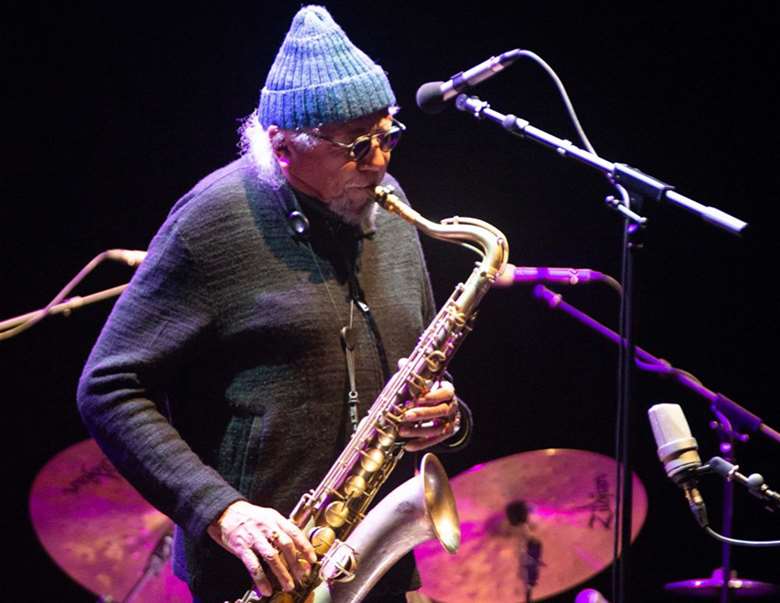Lloyd Lets Beauty Reign At Guimarães Jazz Fest
Nick Hasted
Tuesday, December 3, 2019
Veteran saxophonist among the highlights at annual Portuguese fest

Charles Lloyd’s 82nd year has found him back in Europe, teasing out the differing personalities of guitarists Julian Lage and Marvin Sewell at Ronnie’s, and revisiting Wild Man Dance with an orchestra in Poland. Here, in northern Portugal, his Kindred Spirits band is arranged more conventionally than on Frith Street, with Lage replaced by pianist Gerald Clayton. Lloyd’s ongoing renaissance remains quite as impressive as his original quartet’s million-selling, Fillmore-filling pomp, opening the 26th Guimarães Jazz Festival unimprovably.
He moseys on in beanie hat and jumper, a beatifically hip old cat whose free spirit and loyalty to melody prove inseparable. So much mood, rhythm and momentum pass through a capaciously inclusive ‘Lift Every Voice and Sing’, a ballad redolent of Beale Street which becomes a jagged band maelstrom. Lloyd gives minimalist brilliance to simple slips of tunes. His eccentric, kind man’s dance to his own music, meanwhile, only compares on the contemporary stage to Bob Dylan.
‘La Llorona’ seems a lengthy classical piano piece till Lloyd’s forceful, raw-edged rejoinder, Sewell’s high, thin-air wails and a majestic Lloyd ending of fairy tale rightness. During ‘Dismal Swamp’, he’s under the piano lid like a blues mechanic, shaking maracas and extracting juju. “There’s still all that ugliness out there, and I want to wipe it out with beauty,” Lloyd let it be known on the sleeve of 1969’s Soundtrack. Looking at his lifetime of music in the neighbouring shop afterwards, I’m teary with love at this man’s tireless mission.
When the misty rain shrouding Guimarães’s mountains during this autumn festival lifts, ancient stone churches become places of deep shadow and golden light. This small city’s extensive mediaeval centre gives it a disproportionately rich cultural heart, and my four nights here miss another big-hitting saxophonist, Joe Lovano, but catch Antonio Sanchez, Vijay Iyer and Craig Taborn.
Sanchez’s Migration band are far more convincing live than on their recent album Lines in the Sand. “Do you have a warrant?” a sampled voice asks, as a siren sounds and children cry. Sanchez declares his stand as a master musician who emigrated from Mexico to the USA, and now sees his desperate compatriots “demonised and ostracised and politicised”, thanks to empathy’s erosion. His quintet splits up and recombines its distinct, purposefully blended voices, Thana Alexa a particular asset on vocals and electronics. John Escreet, wearing a mustard onesie he’d regret back in Doncaster, is lovely on electric piano, and abrasive on a Fender Rhodes solo like a Hammond dragged through a hedge backwards. The Oscar-winning Sanchez proves a modest bandleader, his mallet drawing the subtlest shiver from a cymbal at the end of ‘Long Road’, and playing only one major, resourceful solo.
Vijay Iyer and Craig Taborn start their ECM project, The Transitory Poems, with Iyer chipping away at high notes like an ice-pick. Their parallel, mutually unseen piano improv pulls at each other’s hands like psychic marionettes, causing brain-busting double-density, but a tendency to blocky, chopping rhythms. Even the nervous fusillades of coughs suit a classical gig, and without the record’s ECM glow, it’s a hard night to love.
Trio Oliva/Boisseau/Rainey are led by French pianist Stéphan Oliva, whose soundtrack work is shown in his warmly romantic playing on cinematic titles such as ‘Gene Tierney’. Downtown drumming veteran Tom Rainey whips his kit like a reckless jockey, rubs its skins like a potter’s wheel, and is overheard later telling a ribald New York jazz joke with similar, characterful relish.
Chicagoan Geof Bradfield is Guimarães’s artist-in-residence and secret weapon. He cheerfully encourages local talent with his quintet at late-night jams, many of whom pop up again in Porto’s ESMAE jazz school Big Band and String Ensemble, who Bradfield conducts in his own compositions, a Brazilian dance dedicated to Hermeto Pascoal, Ligeti and Shorter. A student trombonist fights through to a strong solo, amid more enjoyable dynamics and colour than is common at such gigs. Later, the annual Porta-Jazz/Guimarães Jazz multi-disciplinary collaboration pairs Valter Fernandez’s hip-hop dancing with a quartet in visually alarming mutual improv. “Everybody has been so tremendously gracious,” Bradfield observes, and that quality defines Guimarães’s gentle people.